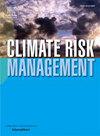A framework for addressing the interconnectedness of early warning to action and finance to strengthen multiscale institutional responses to climate shocks and disasters
IF 5
2区 环境科学与生态学
Q1 ENVIRONMENTAL SCIENCES
引用次数: 0
Abstract
Early warning systems (EWS) inform decision making and planning in response to climate shocks and catastrophic disasters. However, the current disaster response mechanism falls short due to the fragmented warning, action, and finance systems, coupled with inadequate institutional collaboration, coordination and inclusive engagement for effective anticipatory action. This study addresses this challenge by introducing an Early Warning, Action and Finance (AWARE) platform to promote anticipatory action through multistakeholder engagement. Data from literature reviews, expert surveys, and stakeholder workshops in Senegal, Zambia and Sri Lanka helped identify the platform’s needs and priorities. The study draws upon theories of technological frames, interpretative flexibility, boundary objects, social learning, collaborative governance and adaptive co-management to conceptualize a framework for AWARE. Results demonstrate the potential of AWARE as a boundary object that fosters social engagement, active involvement, open communication, collaboration, and shared commitment to safeguarding lives and livelihoods. Analysis of technological frames and interpretative flexibility underscores the role of social learning in shaping the design and user features that promote multiscale institutional responses to disasters. AWARE aligns with the priorities of the Sendai Framework and emphasizes system thinking, co-production of knowledge, and the need for context-specific solutions to enhance anticipatory action. Recognizing the limitations of one-size-fits-all EWS, the AWARE framework acknowledges contextual factors as barriers to implementation. The study underscores the importance of integrated EWS and collaborative efforts to overcome implementation barriers and improve anticipatory action outcomes.
一个解决预警与行动和资金之间相互联系的框架,以加强对气候冲击和灾害的多尺度机构反应
早期预警系统(EWS)为应对气候冲击和灾难性灾害的决策和规划提供信息。然而,目前的灾害应对机制存在不足,原因是预警、行动和融资系统分散,以及机构合作、协调和包容性参与不足,无法有效地采取预期行动。本研究通过引入预警、行动和融资(AWARE)平台来应对这一挑战,通过多利益攸关方参与促进预期行动。来自塞内加尔、赞比亚和斯里兰卡的文献综述、专家调查和利益相关者研讨会的数据有助于确定该平台的需求和优先事项。该研究借鉴了技术框架、解释灵活性、边界对象、社会学习、协作治理和适应性共同管理等理论,对AWARE框架进行了概念化。结果表明,AWARE作为促进社会参与、积极参与、开放沟通、协作和共同致力于保护生命和生计的边界对象具有潜力。对技术框架和解释灵活性的分析强调了社会学习在形成设计和用户特征方面的作用,这些特征促进了对灾害的多尺度机构反应。AWARE与仙台框架的优先事项一致,强调系统思考、知识的共同生产以及针对具体情况的解决方案的必要性,以加强预期行动。意识到一刀切的EWS的局限性,AWARE框架承认环境因素是实施的障碍。该研究强调了综合环境预警和协作努力对克服实施障碍和改善预期行动成果的重要性。
本文章由计算机程序翻译,如有差异,请以英文原文为准。
求助全文
约1分钟内获得全文
求助全文
来源期刊

Climate Risk Management
Earth and Planetary Sciences-Atmospheric Science
CiteScore
8.20
自引率
4.50%
发文量
76
审稿时长
30 weeks
期刊介绍:
Climate Risk Management publishes original scientific contributions, state-of-the-art reviews and reports of practical experience on the use of knowledge and information regarding the consequences of climate variability and climate change in decision and policy making on climate change responses from the near- to long-term.
The concept of climate risk management refers to activities and methods that are used by individuals, organizations, and institutions to facilitate climate-resilient decision-making. Its objective is to promote sustainable development by maximizing the beneficial impacts of climate change responses and minimizing negative impacts across the full spectrum of geographies and sectors that are potentially affected by the changing climate.
 求助内容:
求助内容: 应助结果提醒方式:
应助结果提醒方式:


